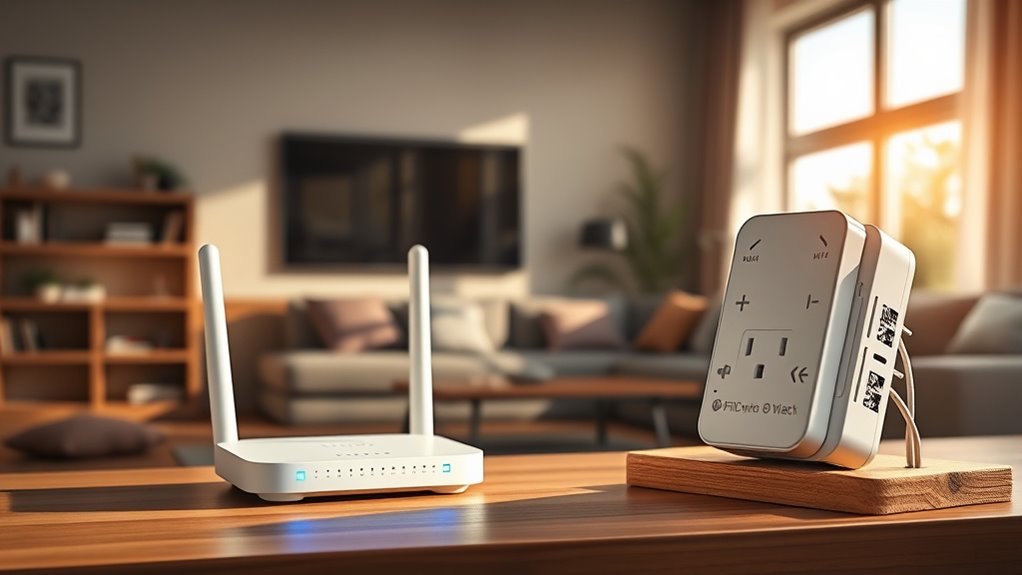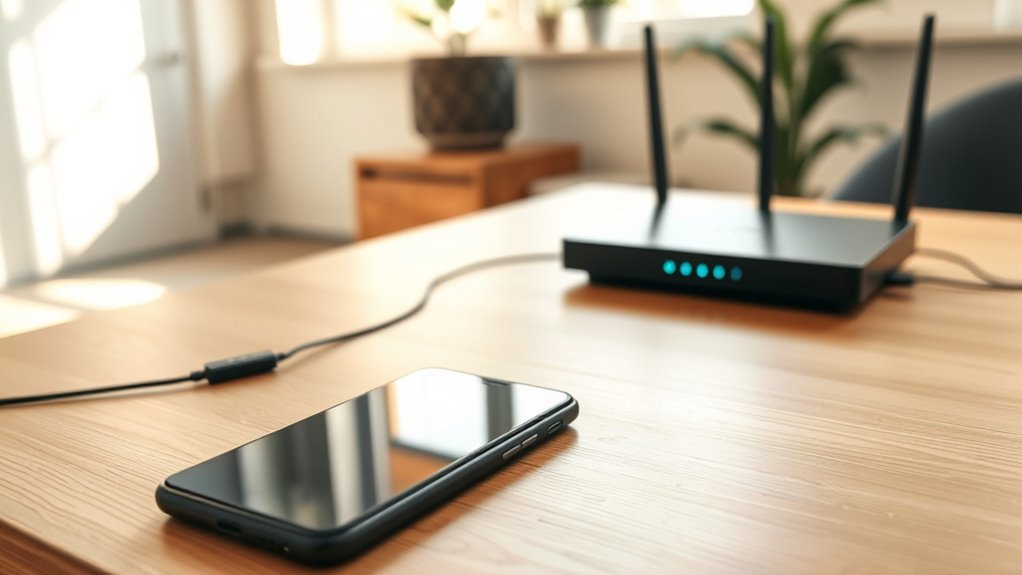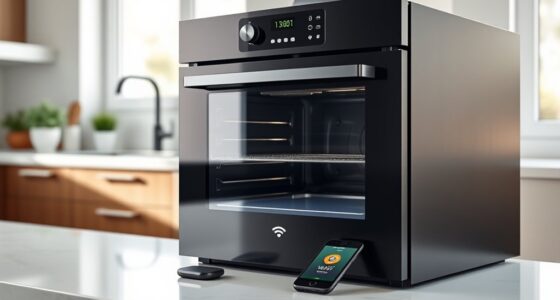Choosing between smart and simple Wi-Fi depends on your needs. If you prioritize security, parental controls, and device management, investing in a smart router makes sense. These features help protect your network and give you easy control over internet access. For basic browsing and streaming, a simple router might suffice. However, if you want a more secure, manageable home network, exploring smart options is worthwhile. Keep going for more details on making the best choice.
Key Takeaways
- Opt for smart routers if security, parental controls, and device management are priorities for your household.
- Basic routers may suffice for simple internet needs without advanced features or enhanced security.
- Investing in smart features makes sense when you require network customization, guest access, and future-proofing.
- Consider the long-term benefits of security updates and device prioritization versus upfront costs.
- Choose smart routers if convenience and comprehensive management tools outweigh the additional expense.

When choosing a Wi-Fi router, understanding the difference between smart and simple features can help you make a better decision. If you’re trying to decide whether to invest in a router with advanced capabilities or stick with a basic model, it’s essential to consider what features actually matter to you. Smart routers often include tools like enhanced network security and parental controls, which can provide peace of mind and better manage your home network. Simple routers, on the other hand, focus on providing reliable internet access without extra bells and whistles.
Network security is one of the key advantages of smart routers. These devices often come with built-in firewalls, automatic firmware updates, and intrusion detection, making it easier to protect your devices from cyber threats. If you handle sensitive information or just want to keep your family safe online, paying for a router with smart security features makes sense. You won’t need to worry about manually updating security protocols or risking vulnerabilities. Instead, your router handles most of that behind the scenes, offering you a more secure browsing experience.
Smart routers offer built-in firewalls, automatic updates, and intrusion detection for enhanced security.
Parental controls are another significant benefit of smart Wi-Fi routers. They allow you to set restrictions on internet access for specific devices, schedule usage times, or block certain websites altogether. This can be especially helpful if you have kids or shared spaces where you want to limit screen time or prevent access to inappropriate content. With simple routers, you might have to configure these controls through third-party apps or manually adjust settings on each device, which can be inconvenient and less reliable. Paying for a router that offers integrated parental controls makes managing your household’s internet use straightforward and less time-consuming.
Beyond security and parental controls, smart routers often include features like device prioritization, guest networks, and app-based management. These tools give you more control over your network, allowing you to optimize performance and customize access. If you’re tech-savvy or just want more convenience, these features can make a noticeable difference in your daily experience. Additionally, considering the safety standards and quality assurances from reputable brands can further ensure your network’s resilience and protection.
However, it’s worth noting that smart routers tend to cost more upfront. If your primary need is just a stable internet connection for browsing, streaming, and basic work, a simple router might suffice. But if you value security, family management, and future-proofing your network, paying for a smart router with these features can be a worthwhile investment. Ultimately, understanding your priorities will help you decide whether the added costs align with your needs and give you a safer, more manageable home network.
Frequently Asked Questions
How Do Smart Wi-Fi Features Impact Overall Network Security?
Smart Wi-Fi features can enhance your network security by automatically enabling stronger network encryption and device authentication. These features help protect your data from unauthorized access and cyber threats, making your connection safer. By managing security settings intelligently, smart Wi-Fi improves your overall security posture, reducing manual effort. So, investing in these features makes sense if you want a more secure, hassle-free network experience that actively defends against potential vulnerabilities.
Are There Specific User Needs That Favor Simple Wi-Fi Setups?
Imagine a cozy corner where everything is straightforward and easy to navigate. You prefer simple Wi-Fi setups when your user interface is intuitive, making it easy for you to connect devices without frustration. User convenience becomes paramount, especially if you’re not tech-savvy or need reliable internet with minimal fuss. In these cases, a simple setup offers peace of mind, ensuring your connection is hassle-free and accessible for everyone in your household.
Can Upgrading to Smart Features Reduce Long-Term Wi-Fi Costs?
Upgrading to smart features can reduce long-term Wi-Fi costs through a thorough cost analysis, revealing potential savings. Smart devices often offer feature benefits like better network management, security, and energy efficiency, which can lower maintenance and energy bills over time. While initial costs may be higher, the enhanced performance and added convenience can make smart upgrades worthwhile, ultimately saving you money and improving your overall Wi-Fi experience.
Do Smart Wi-Fi Features Improve Connectivity in Large Households?
Imagine a bustling household like a lively city, where network congestion can turn smooth browsing into chaos. Smart Wi-Fi features act like traffic controllers, optimizing device management and prioritizing bandwidth. They help reduce interference and improve connectivity, especially in large households with many devices. So, yes, upgrading to smart features can markedly enhance your Wi-Fi experience, making sure everyone stays connected without frustration.
What Compatibility Issues Might Arise With Smart Wi-Fi Devices?
When you use smart Wi-Fi devices, compatibility issues can occur due to device interoperability challenges. Not all gadgets work seamlessly together, especially if they run on different protocols or standards. Firmware updates are vital—they can fix bugs and improve compatibility, but if your devices aren’t regularly updated, you might experience connection problems or limited features. Always check device compatibility and keep firmware current to guarantee smooth operation.
Conclusion
Ultimately, choosing between smart and simple Wi-Fi features is like picking between a high-tech spaceship and a trusty bicycle—you’ll want what fits your journey. If you crave convenience and future-proofing, smart features are your rocket fuel. But if simplicity and affordability are your compass, then basic options will get you where you need to go. Whichever you choose, make sure it aligns with your needs, so your Wi-Fi experience feels as smooth as a well-paved road.









